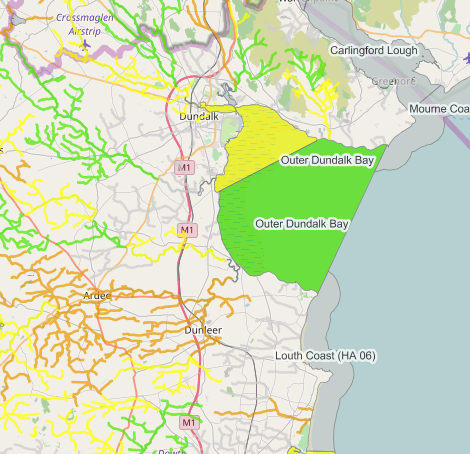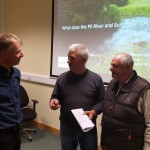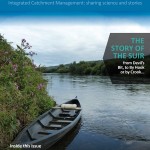Great turnouts and lively discussions were the order of the…
Dundalk Bay Events: What does your river mean to you?
Meetings are being held with communities along the rivers of the Dundalk Bay Catchment.
These free events will allow you to share stories, knowledge and ideas, and learn about how you can create a plan for the future of the rivers of Dundalk Bay.
This is your opportunity to meet individuals and groups who have an interest in the waters, wildlife and heritage on your doorstep.
From the uplands of Cooley, the Big and Flurry Rivers flow to Dundalk Bay; the Cullywater and Castletown flow from South Armagh through Dundalk town; the Fane valley skirts the border making its way through Castleblayney and Inniskeen to the coast at Blackrock. The Glyde rises in the Kingscourt area and meets the Proules from Carrickmacross before advancing to Tallanstown to join the Dee near Annagasson. Nobber streams flow into the Dee then through Ardee to the sea at Annagasson; the White River flows through Dunleer before joining the Dee.
Dundalk Bay is a Special Area of Conservation for Bird species and shellfish and as such is very sensitive to changes in water quality.

These rivers were the roadways of the Ancient East leaving us with an enviable heritage legacy from the Viking forts and the only castle in Ireland built by a woman, Castle Roche, to the land of legends and Irish chieftans.
Today, our waterways are still a most precious resource. Lough Muckno is described as the jewel in the crown of Irish Coarse Angling; the Fane and Castletown are noted for salmon and sea trout. Our waterways provide a home to many of our most iconic bird and wildlife species.
Increasingly, communities and tourists are using waterways as blueways for sport and recreation. The water is also an important resource for economic development throughout the catchment with the Fane, Glyde and Dee providing drinking water for most of the population. Dundalk bay is economically important for fishing and as a recreational amenity.
We are inviting everyone: individuals, businesses, farmers, interest groups, anglers, clubs and communities to participate in our events:
- 28th February 8:00 pm Carlingford Heritage Centre, Carlingford
- 13th March 8:00 pm Carrickmacross Workhouse
- 15th March 8:30 pm Kingscourt Community Centre
- 21st March 8:00 pm Hope Castle Lodge Castleblayney
- 23rd March 8:00 pm Market House Dunleer
- 28th March 8:00 pm Spirit Store, Dundalk
- 30th March 8:00 pm Crossmaglen Community Centre
These free events aim to gather people’s experiences, memories and ideas in order to create a community vision for the future of local waterways. This new approach called the RIPPLE method will include contributions from local speakers and interactive activities to promote sharing and learning and is guaranteed to be fun.
Hosted by the newly established Local Authorities Waters and Communities Office (LAWCO) in order to develop a ‘vision’ for Dundalk Bay rivers. The Waters and Communities office was set up in 2016 to raise public awareness of our water resources and encourage local communities, public bodies and all stakeholders to work together in the management of our natural waters.
Your local Community Water Officer is Gretta McCarron who is looking forward to meeting you at an event near you.
If you have any questions please do not hesitate to contact Gretta at: gmccarron@lawco.ie or see www.watersandcommunities.ie








